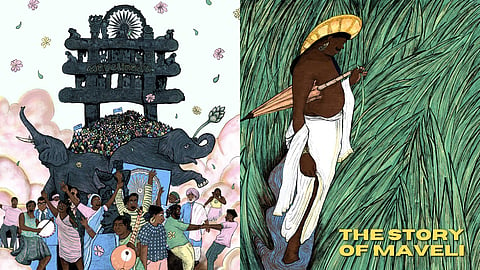
- HOMEGROWN WORLD
- #HGCREATORS
- #HGEXPLORE
- #HGVOICES
- #HGSHOP
- CAREERS
- ABOUT US
- CONTACT US

The myth of Maveli is the story of a leader under whom no inequality existed, before his kingdom was taken over by Vamana, a brahmin avatar of Vishnu, and Maveli was sent to the underworld. Mavelinadu or the land of Maveli, is a casteless, classless world, much like Jyotiba Phule’s Balirajya and Sant Ravidas’ Begumpura. It combines the memory of an egalitarian past, and a future that we may work towards building — through the destruction of oppressive constructs like caste, class, and gender.
— The Mavelinadu Collective
In the mythology of Kerala, the figure of legendary King Mahabali — or Maveli — holds special cultural significance. Remembered as a ruler under whom no inequality existed, his reign is described as an era of caste and class justice and abundance. This golden age was disrupted when Vishnu, in his dwarfish Brahmin avatar of Vamana, banished Maveli to the underworld. Yet the memory of his egalitarian kingdom survives in Kerala’s cultural imagination.
For the Mavelinadu Collective, this story represents a radical framework for a casteless, classless world worth envisioning and working toward. Founded in 2021, the Mavelinadu Collective is an anti-caste, anti-Brahminical publishing house and cultural platform created exclusively by and for people from marginalized population groups. Its aim is both urgent and ambitious: to reframe histories, reclaim erased narratives, and debrahmanise cultural and intellectual traditions. Through fellowships, research support, and a magazine that platforms writers, artists, and scholars from Dalit, Bahujan, Avarna, and tribal communities, the collective seeks to undo centuries of exclusion.
The collective’s pilot project, 'Debrahmanising Gender', is a magazine that marks an intervention to this end. The magazine explores how caste and gender are not separate axes of oppression but mutually reinforcing structures that shape everyday life in India. In a society where mainstream feminist discourse often overlooks caste, their work insists on centering queer, trans, non-binary people and women from oppressed and marginalized communities. By doing so, Mavelinadu aligns itself with a long tradition of radical thought — from Jyotiba Phule’s vision of Balirajya, a kingdom of equality, to Sant Ravidas’ dream of Begumpura, a city without sorrow.
This is an explicit rejection of the literary and intellectual canon dominated by upper-caste voices. For centuries, Brahmanical traditions have defined what counts as legitimate knowledge in India, while simultaneously erasing or appropriating the cultural heritage of marginalised communities. Mavelinadu resists this appropriation by prioritizing oral traditions, folklore, and community histories. In doing so, the collective creates space for alternative forms of knowledge and redefines what publishing itself can mean in a caste society.
In India, publishing has historically been a gatekept space, shaped by caste hierarchies that mirror broader patterns of land ownership, temple access, and political power. When Dalit and Bahujan writers do break through these barriers, their voices are often tokenised, pigeonholed, or mediated by upper-caste editors. Mavelinadu attempts to bypass these filters entirely, giving creators editorial autonomy and material support. By offering fellowships and grants, it also addresses another form of exclusion: the economic precarity that often prevents marginalized voices from pursuing long-term research or creative projects.
The collective’s work is not limited to India. It has participated in international events, such as 'Editorial Tables: Reciprocal Hospitalities', organised by Frame Contemporary Art Finland and The Showroom in London. These collaborations highlight how anti-caste publishing is both an act of localised resistance and part of global conversations about decolonisation, social justice, and knowledge production.
The Mavelinadu Collective is part of a broader resurgence of Dalit, Bahujan, and Adivasi cultural assertion in India. From Dalit literature in Marathi to Adivasi art movements in Chhattisgarh and Jharkhand, marginalised communities have long sought to narrate their own histories. But what sets Mavelinadu apart is its emphasis on infrastructure: not just producing texts but building networks, creating archives, and sustaining platforms that will outlast individual projects. By invoking Maveli’s lost kingdom, the collective gestures toward an egalitarian past while also mapping out a future in which oppressed communities can speak, write, and dream on their own terms.
If you enjoyed reading this, here's more from Homegrown:
Anand Patwardhan’s Jai Bhim Comrade Is An Unflinching Archive Of Indian Caste Atrocities
Panther's Paw Publication Has Created A New Visual Identity For Ambedkar's Seminal Works
Five Essential Books By Dr B.R. Ambedkar You Must Read This Dalit History Month
